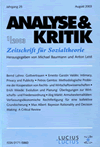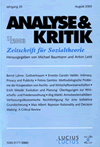Suchergebnisse
"Jon Elster"
Titel: Fehr on Altruism, Emotion, and Norms
Autor: Jon Elster
Seite: 197-211
Abstract: I discuss recent work by Ernst Fehr and his collaborators on cooperation and reciprocity. (i) Their work demonstrates conclusively the reality and importance of non-self-interested motivations. (ii) It allows for a useful distinction between trust and blind trust. (iii) It points to a category of quasi-moral norms, distinct both from social norms and moral norms. (iv) It demonstrates how social interactions can generate irrational belief formation. (v) It shows the potential of punishment for sustaining social norms and for overcoming the second-order free rider problem as well as obstacles to group selection. (vi) It o ers a provocative experimental basis for the `warm-glow' explanation of altruistic behavior. I conclude by suggesting some experiments that might allow for further developments of the theory.
Titel: Social Selection, Agents, Intentions, and Functional Explanation
Autor: K. Brad Wray
Seite: 72-86
Abstract: Jon Elster and Daniel Little have criticized social scientists for appealing to a mechanism of social selection in functional explanations of social practices. Both believe that there is no such mechanism operative in the social world. I develop and defend an account of functional explanation in which a mechanism of social selection figures centrally. In addition to developing an account of social selection, I clarify what functional hypotheses purport to claim, and re-examine the role of agents, intentions in functional explanations in an effort to show why a mechanism of social selection is indispensable to adequate functional explanations.

Ernst Fehr on Human Altruism. An Interdisciplinary Debate
2005 (27) Heft 1
Editorial
In the foregoing decade, two related developments in the behavioural sciences have drawn the attention of social scientists, particularly economists. The first is the use of laboratory experiments in the investigation of human behaviour. Although the use of such experiments has a longer history, only in the last decade has ’experimental economics’ become a sub-discipline of economics with which economists of just about all colours are familiar; indeed, experimental results regularly feed int...

Funktionalismus
2002 (24) Heft 1
Editorial
Vor gut 50 Jahren wurde die amerikanische Soziologie fast vollständig von T. Parsons' Programm des 'strukturellen Funktionalismus' dominiert. Erst in den 1960er Jahren begann das strukturfunktionale Programm an Einfluss zu verlieren, als seine auf Bestanderhalt und Stabilität ausgerichtete Grundidee mit der sich rapide verändernden Gesellschaft des sich verschärfenden Vietnamkriegs, der black-power-Bewegung und der Studentenrevolte in zunehmenden Widerspruch geriet. Starke Armut und einseiti...